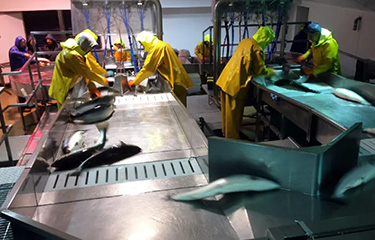Compassion in World Farming is a farm animal welfare organization dedicated to ending factory farming and achieving humane and sustainable food.
On 1 September, the Aquaculture Stewardship Council opened the second and last open public consultation on its fish welfare project.
This project aims to identify key impacts on farmed aquatic animal welfare and develop new and improved welfare standards. ASC’s draft humane slaughter standards for fish include a ban on the use of ice slurry – a cruel slaughter method that leaves fish fighting for their lives as ice gets lodged in their gills. This follows Friends of the Sea’s 2021 introduction species-specific welfare standards to improve fish rearing, slaughter, transport, handling, and welfare training.
The introduction of basic welfare standards for farmed fish by two international certification schemes has been welcomed as “an important step forward” by Compassion in World Farming. Across the world, approximately 1 percent of farmed fish are certified by Friends of The Sea and a further 1 percent are certified by ASC, according to the International Institute for Sustainable Development. This is the equivalent of hundreds of millions of fish each year.
While these moves align with the organization’s guidelines for humane slaughter, it warns that much more needs to be done to improve the lives of fish that suffer silently in underwater factory farms.
Other welfare issues include overcrowding and starvation, lack of enrichment, and poor water quality. For example, withholding food can be partially beneficial for fish – as clearing the gut before transport means that there is less waste excreted into the water while fish are transported. However, some fish may be starved for more than two weeks, when no more than two or three days are normally needed to empty the gut.
Fish are sentient creatures, and recent scientific research has discovered that they not only feel pain and experience fear but – like many other animals – they explore, travel, socialize, hunt and play. All farmed fish would benefit from humane slaughter, gentle handling, conditions that provide good water quality, and environments that meet their physical, mental, and behavioral needs.
Many certification schemes focus primarily on the environmental impact and the sustainability of fish stocks and have vague or inadequate welfare protections in place. This means that fish are often killed inhumanely, enduring slow, painful deaths by asphyxiation, crushing, or even being gutted alive.
“The addition of these first fish welfare standards, some of which are still in draft form, is great news and an important step forward for millions of fish. However, there is still much more to be done to improve the lives of the billions that suffer silently in underwater farms all around the world,” Compassion in World Farming U.S. Executive Ben Williamson said. “Just like other animals, fish are intelligent, sentient beings that need protection from unnecessary suffering – something we know consumers support. The adoption of welfare standards by fish certification schemes also gives them the ability to choose higher-welfare products. That’s why we’re working with fish-certification schemes to ensure that new welfare standards are properly implemented and that schemes that are yet to take that first step to better welfare get the support and advice they need.”
Photo courtesy of Global Seafood Alliance






